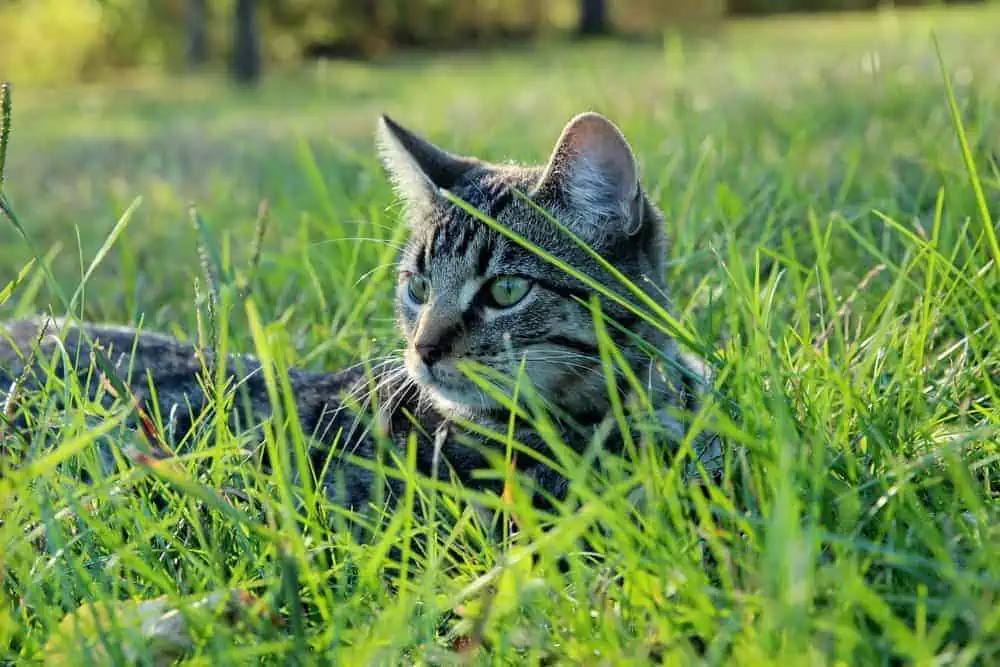
Any ailurophile (cat lover) will tell you that cats are obligate carnivores, which means they need to eat meat to survive and thrive. As hunting animals, they have evolved to become dependent on a strictly meat-only diet and don’t have the special enzymes or metabolic pathways to digest and convert nutrients in plants to what they need. Despite this, why do some felines feel the need to eat grass?
It’s a mystery that cat experts have been debating for years. In search of an answer, researchers from the University of California School of Veterinary Medicine surveyed more than 1,000 cat owners who were tasked with spending at least three hours a day observing their pet. The volunteer cat watchers reported:
- 71% of cats were seen eating plants at least six times
- 61% were seen eating plants over 10 times – and 67% of these cats were estimated to eat plants daily or weekly
- 11% were never observed eating plants
It’s often been suggested that cats eat grass to help them throw up when they’re feeling ill. And, the study showed that a quarter of grass eaters were observed vomiting after consuming a plant-based feast. However, a whopping 91% of respondents said their cat did not appear sick before eating grass. This caused the researchers to question the traditional theory.
A common trend among carnivores
The California-based scientists suggest that regular plant-eating by domestic carnivores is a reflection of an innate predisposition of regular plant-eating by wild ancestors – something supported by numerous reports of wild carnivores eating plants. Their theory is that chowing down on greenery helps animals expel intestinal parasites by increasing muscle activity in the digestive tract. Moreover, they suggest that any vomiting is an occasional by-product of eating grass, not the objective.
So, if it’s natural behaviour, should you supply your favourite feline with a selection of tasty grasses along with their regular cat food? It’s a resounding ‘yes’ from International Cat Care. The charity advises that all cats should be provided with grass either from an outdoor or indoor source (grown in a pot) to enable them to exhibit their natural grass-eating behaviour, while preventing them from ingesting unsuitable potentially toxic greenery. But what grass should you choose?
Grow your own or ready to eat
If you’re not the green-fingered type and don’t know your meadow foxtail from your Yorkshire fog (after all, there are 12,000 grass species worldwide ranging from wheat to bamboo) the good news is that you can buy cat-friendly grass seed pouches, grow your own kits or ready-grown grass. Companies such as My Cat Grass have a range of varieties including Organic Spelt Wheat (lush, dark green leaves), Organic Barley (softer shoots, for cats with sensitive digestion) and Organic Oat (nutrient rich). For the ultimate in ‘grassware’, there’s even a Cat Grass Station – a wall-mounted cat grass holder that’s leak-proof, hygienic (dishwasher safe) which you can place at exactly the right height for your cat’s convenience, creating the perfect breakfast buffet bar to suit the fussiest of felines.
Grass-feeding top tips
- To avoid confused kitties, remove any toxic greenery from your home (and garden). International Cat Care has a comprehensive list of plants that are poisonous to cats here >>
- Most cats will just nibble at the tops of the grass, so if you keep it watered the plant should continue to come back and last for a while.
- Be aware that over time, grasses can develop mould, especially if over-watered. If you spot any signs of mould, get rid of the pot and start a new batch from scratch.
- If your cat seems to be eating grass at every opportunity, it could indicate that something’s not right and you should get your pet checked out by your vet.
If you found this interesting, you may also like:
WHY THE CAT’S WHISKERS CAN PUT THEM OFF THEIR DINNER
Does your cat bat the food out of his bowl before he eats it? The reason could be something known as ‘whisker fatigue’ – a condition that some experts believe causes felines serious stress at feeding time …
WHY YOU SHOULD LET YOUR CAT PUZZLE IT OUT
Feeding time should be more than just dishing out a bowlful of food. It’s time to let our felines work for their dinner. Here’s why...
FELINE BEHAVIOUR – STRANGE, BUT TRUE...
Why does my cat rub around my legs, grab my hand when I tickle his tummy, drink from the tap and knock everything off my desk? Our mission is to solve some of the most puzzling feline mysteries…
Sources: vettimes.co.uk, icatcare.org, petmd.com, aaas.org, woodlandtrust.org.uk














